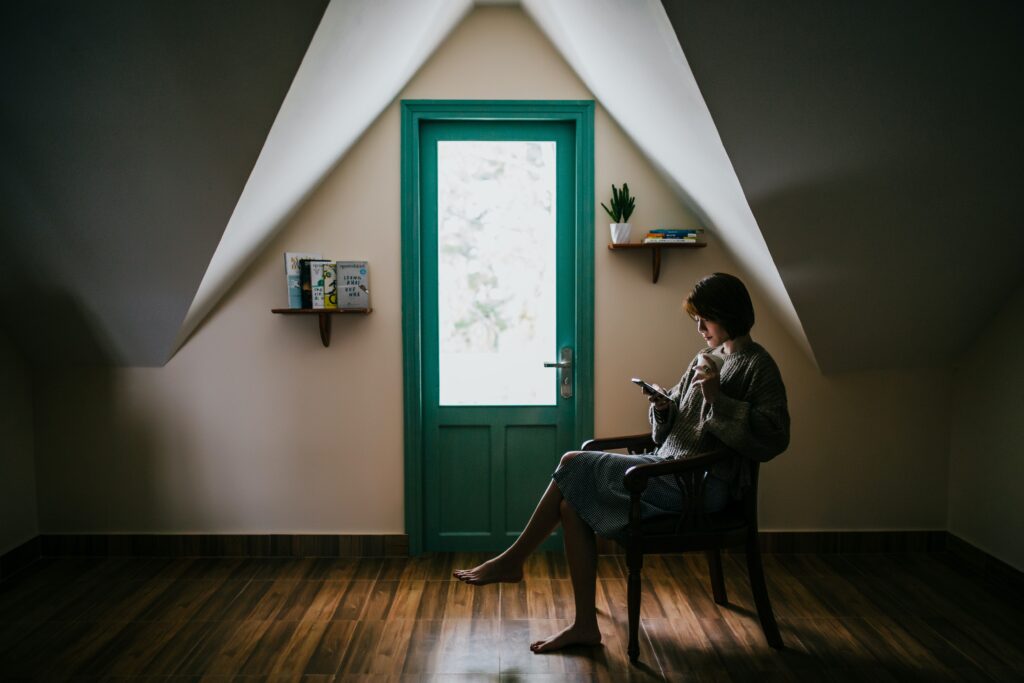
“You never had your own room? You shared with your mother?” My friend is aghast.
“I know,” I say, part of me still fifteen and fuming. “But it was just the two of us in a little one-bedroom apartment.” I did have time to myself; my mom worked full-time. But I had to listen to my grade-school friends crow when they got their own room, a rite of passage I could tell was both a reward and an acknowledgment. Sharing felt childish and suffocating.
Years later, when I read “A Room of One’s Own,” Virginia Woolf’s essay made instant sense to me. Yes, she was airing all the domestic burdens that hamper women writers, but more to the point, but she had named my secret craving.
So did Harry Potter’s Room of Requirement, which appears by magic at the moment you need it. “How many people know about it?” Harry asks, and Dobby replies, “Very few, sir. Mostly people stumbles across it when they needs it, sir, but often they never find it again, for they do not know that it is always there waiting to be called into service.”
If only.
Middle-class America might insist on every kid having their own room, but for most of the world, that is an impossible luxury. So is the ability to write in peace and solitude. When I see people who do not have a home, I worry less than I should about the real dangers, the cold and hunger, the violence, because I am haunted by the constant scramble to find a place you can let down your guard. A place that can be yours for a little while, at least long enough to get some rest.
Then I think of that famous midwinter night when there was no room at any inn. Imagine being heavily pregnant, exhausted, riding a donkey through the black night, irritated that your husband cannot fix this. Your water breaks, soaking the saddle blanket, and your body clenches like a fist, hot and fierce. The donkey’s movement jostles the body curled inside your own, and bent double with the pain, you nearly slide off. Gasping, you wipe sweat from your stinging eyes and look wildly around you and spot, just as Joseph does, a stable. You rush toward shelter.
How lovely it would be if we could carry four walls with us the way that turtles bear their shells. Then we would always have our own room, could retreat into privacy to give birth or weep or think. As it is, our only option when we are thrown into chaos is to turn gruff and withdraw emotionally, which feels rude. We need the excuse and the protection of a room.
Even monks are given their own cell. Kids jammed together into tight spaces hang blankets and curtains as partitions. A room can be temporary or permanent, hard-edged or makeshift. Whatever its shape, it will function as a container, locating you, creating boundaries around you, catching the spillover as you try to express yourself.
High school speech meets were so terrifying—what if your mind went blank and you started talking gibberish?—that you could smell the sweat in those long, unfamiliar hallways. We would be told where our room was, and I, blessed with zero sense of direction, would be so worried about getting lost that my friends would dutifully drop me off at “my room” before finding theirs.
In college, the ordeal at the start of the semester was figuring out where each class met, what room. Or who to room with (the ultimate compliment). Then that first apartment, all the rooms yours. And travel: the instant lift of tension when the desk clerk agrees that you have indeed reserved a room, records your credit card, and hands over the card key with a little flourish: This is your room. This is your temporary refuge from the wondrous sights, the chatter, the mad race to experience everything. “I’m going to run up to my room for a bit,” you can say, and then you slide the card into the reader, hear that tiny click, and enter, as if by magic, the room you needed in this new place.
Dag Hammarskjold was wise to insist on a meditation room at the United Nations. That is the sort of room that empties itself, makes itself yours. Shields you. The story I like even better, though, is the unfinished room in the building’s ECOSOC Chamber. It was designed by the Swedish architect Sven Markelius, and it is a grand, airy, well-structured room, but part of the ceiling remains unfinished. Supposedly, he quipped, “I will finish my work when you finish yours.” The symbolism, in other words, was deliberate. The Economic and Social Council is well aware that its work may never be finished; that development—the construction of rooms upon rooms, enough to shelter people in every nation—may always be a work in progress.
We need to give each other rooms. Giving “space” can be necessary, but space also needs to be enclosed; to protect what lies within its walls. That is what makes Rainer Maria Rilke’s definition of love so tender: his insistence that “two solitudes protect and touch and greet each other.” In a letter to the painter Paula Modersohn-Becker (whom he met and fell instantly in love with, not knowing she was betrothed to another man) he wrote, “I hold this to be the highest task for a bond between two people: that each protects the solitude of the other.”
Instead of the free-floating nothingness, the ostentatious withdrawal of “giving space,” we become a Room of Requirement for someone we love. We conjure whatever they need right now to feel free and sheltered at once.
Read more by Jeannette Cooperman here.
